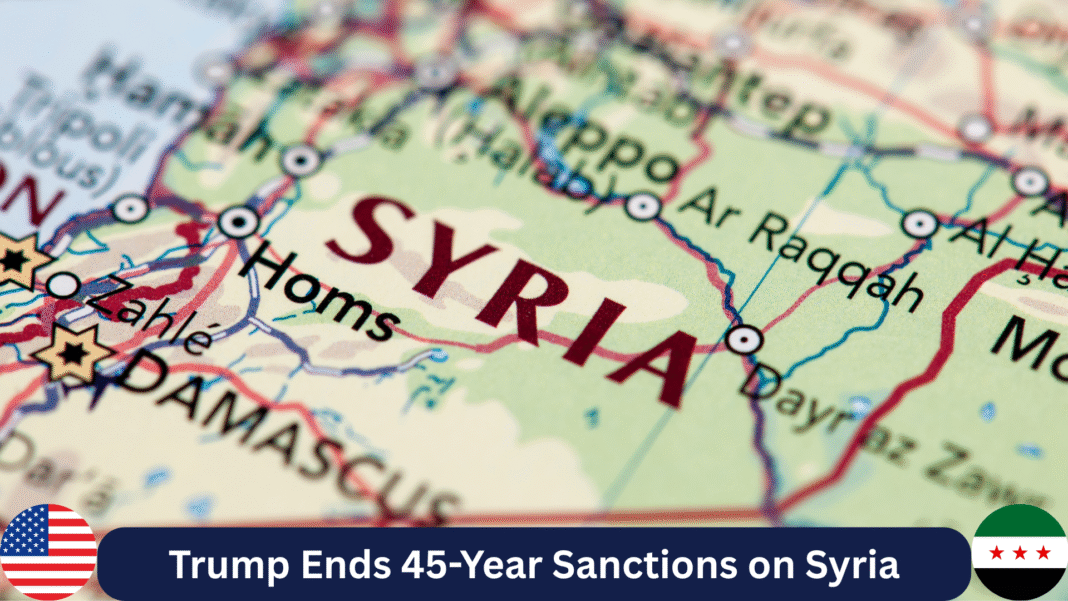Trump’s Surprise Sanctions Lift Spark Hope and Caution in a Post-Assad Syria
When President Donald Trump stepped onto the stage in Riyadh and lifted over four decades of sanctions on Syria, the world watched in stunned silence. Now, as Syrians light fireworks and analysts caution patience, this moment marks a profound shift in the nation’s journey toward uncertain recovery and global reintegration.
Trump’s Surprise Sanctions Lift Spark Hope and Caution in a Post-Assad Syria
Even when President Donald Trump made his appearance at the grand U.S.-Saudi Investment Forum in Riyadh and declared the end of over four decades of punishing U.S. sanctions against Syria, no one there could have predicted the enormity of what would follow. Delivered to a Saudi audience and boldly promising “we’re taking them all off,” the announcement rippled across global diplomacy and prompted jubilant celebrations in Syrian cities such as Damascus and Latakia.
This surprising change in U.S. foreign policy came after the December removal from power of the longtime ruler of Syria, Bashar al-Assad, following 13 ¾ years of a horrific civil war. His ouster, which was achieved in an 11-day lightning offensive by rebel forces that was remarkably low in blood, has created a power vacuum that was filled by interim President Ahmed al-Sharaa. Once a top leader in Hay’at Tahrir al-Sham (HTS), which was formerly affiliated to al-Qaeda, al-Sharaa’s ascent is as divisive as it is transformative.
But even as fireworks erupt and car horns blare across Syrian streets, many are left asking themselves: what does this really mean for the future of Syria, its people and the wider Middle East?
A New Verse in a Bloody Legacy
The American government first imposed sanctions on Syria in 1979, when the regime of Mr. Assad’s father was named a state sponsor of terrorism. The restrictions mounted over the decades, with major additions in 2004 and again in 2011 after the eruption of Syria’s devastating civil war. The Caesar Syria Civilian Protection Act of 2019 added another set of layers, focusing on individuals linked to Assad’s regime and effectively pushing Syria from the global financial system.
These acts of sanctions resulted into a gigantic humanitarian- and economic crisis. According to the United Nations, more than 300,000 Syrians were killed in the war, and nearly 13 million were driven from their homes. Services deteriorated, infrastructure crumbled and ordinary Syrians found it difficult to receive even small amounts sent by family abroad because of restrictions imposed by the international banking system.
For 23-year-old Jumana Hayek, a student in Aleppo, it involved accepting that she might be arrested to receive €100 a month from her brother in Germany. We suffered a lot, but things will change now,” she said, echoing a feeling among many Syrians who consider Trump’s decision a lifeline.
Economic Possibility and Fearful Uncertainty
The cost of rebuilding Syria, so far, has been pegged at up to $400 billion. Though the last thing the international community was funding was multibillion-dollar investments in a bombed-out country, lifting the sanctions could free up much-needed cash to also start to rebuild Syria’s infrastructure and economy, rather than merely the people of Ukraine and Gaza as had been the case in the past, analysts say.
“This is a major, good thing for the hopes of Syria to be able to heal and get back to the civilian function of a nation state,” said Aron Lund, a fellow at Century International. “Very few positive things going on in Syria.
Trump was persuaded to take the action by the cooperation of Syria’s neighbors — primarily Saudi Arabia and Turkey. Neither country wishes the resurgence of waves of refugees, terrorism, or Iranian influence. The United States would seem, by ending the sanctions, to be keeping open its option to back a stable Syrian ally against shared regional enemies.
Qatar, which had promised $29 million a month for three months to cover government salaries in Syria but had not done so because of previous sanctions, could now increase its financial support. Other countries, such as the UAE, are also likely to ramp up their involvement as regional players re-evaluate their relations with Damascus.
Trump and Al-Sharaa: A Staged Bet
Trump held a three-way, teleconference meeting with President al-Sharaa in Riyadh, seated beside Saudi Crown Prince Mohammed bin Salman, and with Turkish President Erdoğan participating remotely on Wednesday. Trump would go on to call al-Sharaa a “tough guy” and a “fighter,” a notable testament from the president to his personal confidence in the young leader.
The Jihadi commander’s rise to head of state has been nothing short of dramatic and controversial. He was a onetime member of militant Islamist networks, including al-Qaeda, who spent time in U.S. custody at Camp Bucca in Iraq as Abu Mohammad al-Jolani. His leadership of HTS – identified by an earlier name as a terrorist group – and his group’s part in the fall of Assad has drawn concern from abroad.
Yet al-Sharaa has also made some significant signals of moderation. He has named women and minorities to positions in government and promised not to enforce Sharia law. Still there are concerns about sectarian tensions and fear of a backlash from, especially, the Alawites (the sect to which Assad belonged).
“There is the danger that the Syrian government, which is very much a hardcore Islamist (movement), continues to do terrible things: more massacres, Christians getting killed,” Aron Lund cautioned. “It’s not a no-risk decision.”
A Long Road Ahead
Experts warn that despite the fanfare and global spotlight, the easing of sanctions will not happen overnight. Congress has passed the 2019 Caesar Act, which constitutes a major legislative hurdle. The Trump administration now would need the backing of Congress to completely undo those sanctions, said Aaron Y. Zelin of The Washington Institute.
However long the process may be, Zelin sees the announcement as “huge, monumental news for the Syrian government.” It would clear the way for Syria to re-enter the world financial system, fostering investment, development and trade. “Everything is a cash economy right now,” he added.
Benjamin Fève, a senior analyst at Karam Shaar Advisory, struck a note of realism, noting that removing the sanctions wasn’t as easy as a presidential declaration. “Regardless, sooner or later this announcement will have to be accompanied by action.
Geopolitical Ramifications
Outside Syria, the ramifications of Trump’s move are broad. Israel, which has carried out airstrikes in Syria to try to prevent the buildup of Iranian forces there – most recently near Damascus – is monitoring the developments closely. Trump has pushed al-Sharaa to sign the Abraham Accords and normalize relations with Israel, a tall order for a country so recently ruled by an anti-Israeli government.
That could dilute the influence of Iran, one of Assad’s major supporters. Hezbollah, another of Iran’s allies, has already suffered strategic defeats, and its operations could be further restricted if Syria aligns more closely with the U.S. and its regional allies.
Russia, for its part, is at a crossroads as well. Since the fall of Assad has become increasingly likely in the past year, Moscow has been supplying oil to Damascus – but if Washington joins the fray more directly, Moscow’s ability to influence events may diminish. And while Zelin says Russia could attempt to use its oil to retain its influence, the country’s long-term influence in Syrian is now also uncertain.
Cautious Optimism
Many Syrians are cautiously hopeful about what comes next. Nasser Eido, 49, a lawyer who has returned to his hometown of Damascus after years living in Norway during the war, expressed an aspiration that has been shared by many. “I would like to see Syria like them (the) UAE, Qatar or Saudi,” he said. “I’m optimistic we can make this happen. The former regime looted the country’s resources; they kept the people poor and left them starving.”
For mothers like Dalal Qallab from Latakia, Trump’s pledge struck a visceral note. “Trump said he would give us a chance and we deserve the chance,” she said as she held her children close among the crowd. “It was a historic moment. It brought us hope for a better life.
Though hope floods the streets now, the road ahead is fraught with political, legislative and humanitarian hurdles. Yet for the first time in more than a decade, many Syrians can imagine a future not of war and isolation but of reconstruction, reintegration and an uneasy peace.
Conclusion
Trump’s decision to lift sanctions on Syria after Assad’s fall has brought renewed hope to a nation battered by war. While optimism runs high among Syrian citizens, global leaders and analysts remain cautious due to the many hurdles ahead. The success of Syria’s future now hinges on pragmatic leadership, international support, and whether the promises of this dramatic policy reversal can be transformed into tangible, lasting change.
FAQs
What triggered the lifting of U.S. sanctions on Syria?
The sanctions were lifted after the ousting of Bashar al-Assad and the rise of interim President Ahmed al-Sharaa, prompting President Trump to declare the end of U.S. economic restrictions during a summit in Riyadh.
Is the lifting of sanctions legally binding and final?
No. While Trump made the announcement, legal restrictions like the Caesar Act passed by Congress still require repeal or amendment to permanently lift sanctions.
What are the potential benefits for Syria?
The lifting of sanctions could open Syria to foreign investment, ease humanitarian aid flow, improve infrastructure, and help reintegrate the country into the global economy.
Who is Ahmed al-Sharaa and why is he controversial?
Ahmed al-Sharaa, formerly part of HTS and with past links to al-Qaeda, has taken leadership after Assad’s fall. Despite his extremist background, he has made reformist gestures like including minorities in governance.
How are other countries responding?
Countries like Saudi Arabia, Qatar, Turkey, and the UAE are increasing engagement. Israel and Russia are watching closely, wary of how the power shift impacts regional alliances and threats.
Reference
Trump shocks and delights Syrians by lifting sanctions after 45 years. Now what?
Breaking Down Trump’s Plan to Lift U.S. Sanctions on Syria
Stay updated with all the latest news and insights – News Of US






